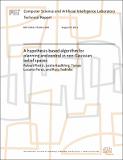Browsing Computer Science and Artificial Intelligence Lab (CSAIL) by Title
Now showing items 1538-1557 of 3804
-
HULA: An Efficient Protocol for Reliable Delivery of Messages
(1997-07)We present a new protocol for reliable delivery of messages over a network that might lose, duplicate, reorder, or arbitrarily delay packets. It is the first protocol that guarantees exactly-once and ordered delivery on a ... -
Human Document Classification Using Bags of Words
(2006-08-09)Humans are remarkably adept at classifying text documents into cate-gories. For instance, while reading a news story, we are rapidly able to assess whether it belongs to the domain of finance, politics or sports. Automating ... -
A Human Oriented Logic for Automatic Theorem Proving
(1972-10-01)The automation of first order logic has received comparatively little attention from researcher intent upon synthesizing the theorem proving mechanism used by humans. The dominant point of view [15], [18] has been that ... -
Hybrid Atomicity for Nested Transactions
(1992-10)This paper defines the notion of hybrid atomicity for nested transaction systems, and presents and verifies an algorithm providing this property. Hybrid atomicity is a modular property; it allows the correctness of a system ... -
Hybrid Caching for Scalable Oject Systems (Think Globally, Act Locally)
(1994-04)Object-based client caching allows clients to keep more frequently accessed objects while discarding colder objects that reside on the same page. However, when these objects are modified and sent to the server, it may need ... -
Hybrid I/O Automata
(1995-12)We propose a new hybrid I/O automaton model that is capable of describing both continuous and discrete behavior. The model, which extends the timed I/O automaton model of [12, 7] and the phase transition system models of ... -
Hybrid I/O Automata*
(2003-01)Hybrid systems are systems that exhibit a combination of discrete and continuous behavior. Typical hybrid systems include computer components, which operate in discrete program steps, and real-world components, whose ... -
Hybrid I/O Automata*
(2002-02)Hybrid systems are systems that exhibit a combination of discrete and continuous behavior. Typical hybrid systems include computer components, which operate in discrete program steps, and real-world components, whose ... -
Hybrid I/O Automata*
(2001-09)Hybrid systems are systems that exhibit a combination of discrete and continuous behavior. Typical hybrid systems include computer components, which operate in discrete program steps, and real-world components, whose ... -
Hypergeometric Functions in MATHLAB
(1970-06-01)This memo describers some of the important properties and manipulations of Hypergeometric Functions which my be useful in MATHLAB. A convention for representing the function is adopted which is readily adaptable to ... -
Hyperglue: Designing High-Level Agent Communication for Distributed Applications
(2006-03-01)We are building a new communication model and discoverysystem which will allow agent-based intelligent spacesto interact with one another. This new infrastructure layer,called Hyperglue, coordinates agent actions at a ... -
Hypothesis Formation and Evaluation in Medical Diagnosis
(1975-01-01)This thesis describes some aspects of a computer system for doing medical diagnosis in the specialized field of kidney disease. Because such a system faces the spectre of combinatorial explosion, this discussion concentrates ... -
A hypothesis-based algorithm for planning and control in non-Gaussian belief spaces
(2011-08-27)We consider the partially observable control problem where it is potentially necessary to perform complex information-gathering operations in order to localize state. One approach to solving these problems is to create ... -
An Hypothesis-Driven Recognition System for the Blocks World
(MIT Artificial Intelligence Laboratory, 1974-03)This paper presents a visual recognition program in which recognition process is driven by hypotheses about the object being recognized. The hypothesis suggests which features to examine next, refines its predictions based ... -
A Hypothesis-Frame System for Recognition Problems
(MIT Artificial Intelligence Laboratory, 1973-12)This paper proposes a new approach to a broad class of recognition problems ranging from medical diagnosis to vision. The features of this approach include a top-down hypothesize-and-test style and the use of a great deal ... -
Hypothesizing and Refining Causal Models
(1984-12-01)An important common sense competence is the ability to hypothesize causal relations. This paper presents a set of constraints which make the problem of formulating causal hypotheses about simple physical systems a ... -
Hypothesizing Channels through Free-Space in Solving the Findpath Problem
(1983-06-01)Given a polyhedral environment, a technique is presented for hypothesizing a channel volume through the free space containing a class of successful collision-free paths. A set of geometric constructions between obstacle ... -
Hypothesizing Device Mechanisms: Opening Up the Black Box
(1988-06-01)I describe an approach to forming hypotheses about hidden mechanism configurations within devices given external observations and a vocabulary of primitive mechanisms. An implemented causal modelling system called ... -
A Hypothetical Monologue Illustrating the Knowledge Underlying Program Analysis
(1979-01-01)Automated Program Analysis is the process of discovering decompositions of a system into sub-units such that the behavior of the whole program can be inferred from the behavior of its parts. Analysis can be employed ...



















